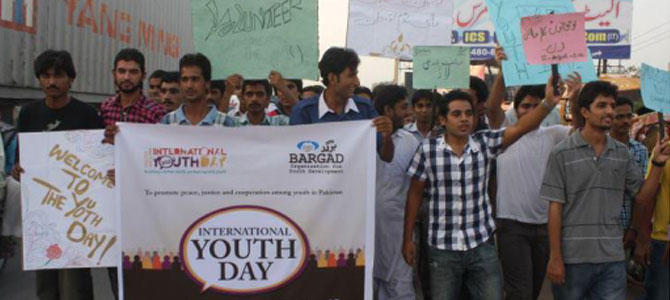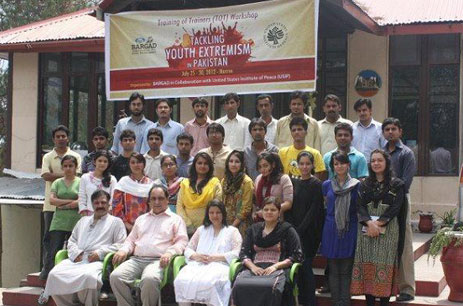Pakistani youth face an increasingly challenging array of extremist messaging from media outlets, school curriculum, and jihadi organizations that encourage intolerance, prejudice and violence. This is exacerbated by the country’s youth bulge that overextends the capability of the government and civil society to meaningfully build the capacity and aptitude of youth to reflect on extremism and challenge violence. However, universities supply the structure necessary to provide vitally needed education and preparation for youth to assume future leadership positions in the promotion of peace through diversity and coexistence.

Reflecting the Institute's commitment to utilizing cost-effective approaches to empower others with the knowledge, skills, and resources to resolve and prevent conflict, USIP supports Pakistani nonprofit organizations that facilitate youth leadership efforts to oppose violent extremism. With the support of USIP, the Bargad Society for Human Resources is training a dedicated pool of 50 young faculty members and youth activists from 20 universities in Pakistan to create communication platforms for youth to understand and confront the sources and causes of intolerance and hatred. The training focuses on countering the hateful and derogatory content and messaging produced by school curriculum and the media, and on developing mechanisms for pro-peace youth engagement.

University students complete Bargad’s “Tackling Youth Extremism in Pakistan” training.
The trained alumni of the project are now using the learned skills and tools to lay the foundation for a nationwide hub to promote tolerance, diversity and co-existence. The hub has already hosted seminars on “Engaging Elected Officials in Youth Campaigns” and “Tackling Youth Extremism” to further connect with youth on university campuses, as well as organizing International Youth Day activities in 10 districts across Pakistan. Bargad is also organizing a contest of innovative ideas on youth and extremism where youth are submitting pioneering, innovative ideas and recommendations to deal with the challenges they face. The prime aim of the contest is to challenge youth to think critically and creatively on the most effective impacts they can have to counter the extremist messaging they are exposed to in their daily life. A selection of the best entries will be published and publicly distributed.
Bargad is publicizing the efforts and achievements of the trained alumni by broadcasting four television programs and eight radio shows. Youth activists are central to the programming along with former extremists who reject their past. So far, two radio programs have aired and the initial TV program.
While the preliminary effects of positive youth engagement will be evident in the youth innovation contest and radio and TV programs, USIP recently met with the project team and youth leaders from participating universities to assess the project progress and discuss its achievements. The project is well on track to provide university youth the training and skills, and more importantly the space, to lay the foundation for peaceful and positive initiatives that encourage nonviolent conflict resolution and promote tolerance, diversity and respect for others beliefs and values.



